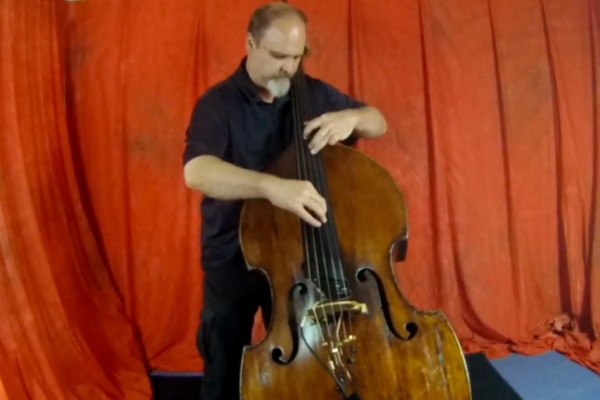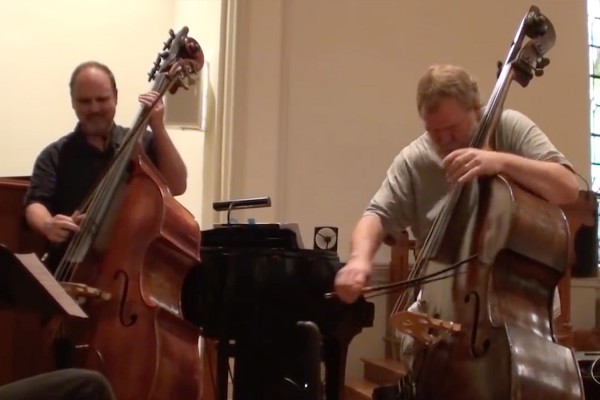The Lowdown with Dr. D.: Electric, Upright or Both?
I constantly receive questions in my email box from aspiring bassists. Unfortunately sometimes these pile up and I can’t always get to everyone’s question in a timely manner, or even send a personal response. So for the next couple of installments, I thought I would take some time here on The Lowdown and answer a few of the more common questions that I get.
I love both the Electric bass and the Upright bass, and I just can’t seem to give one or the other up. Do I have to choose, or should I continue to play both? – John S. from PA.
This is a big question. I would like to answer this question on two fronts. First I would like to consider it from a gigging perspective, and then I would like to address the question from the artistic side.
My gigging answer is short and simple. It is a sensible career move to be able to play both instruments at least adequately. “Doubling” is a valuable skill to have and expands your performing potential, and therefore your employment opportunities, greatly. For some work, like playing for Broadway-type Musicals, it is pretty much a necessity, as many “books” require the player to switch quickly from one instrument to the other. Furthermore, if you find yourself in an orchestral situation you can sometimes get paid a doubling fee. If you play in the orchestral section for part of a concert, and play Electric bass on another you are “doubling.” Same time commitment, with increased pay. This doesn’t happen in Beethoven, of course, but it does occur on some Pop’s concerts, etc. These are just some examples of how it increases your earning potential. So, from a gigger’s perspective, I would suggest that everyone double. You should keep on playing both Electric and Upright so long as it services your career.
Your question is more difficult to answer from an artistic perspective. As anyone who reads this column regularly knows, I support the quest for mastery on an instrument. However, if you are not interested in mastering one instrument or the other, then I would also suggest that you continue to play both without any concern for choosing. Having an average command of both instruments is not an insurmountable goal for a musician with moderate talent.
If, however, you wish to master one or both instruments, you should consider if you can devote the time required to be a master of both instruments. This is a legitimate concern and should be pondered. There are, of course, notable examples of high-level performers who are equally comfortable on Electric and Upright. They show us that it is possible to master both. However, skills are perishable, and it takes constant attention to maintain a high artistic level on both instruments. While it is not unachievable for one to play both instruments masterfully, one may find they have to let one suffer while gaining, or maintaining, mastery of the other.
Although everyone’s situation is different, my observation has been that that those bassists who love both instruments equally, and play both masterfully, find that their career often makes a temporary choice of instrument for them. They tend to have stretches of time where they are playing primarily Electric, followed by stretches where they are playing primarily Upright. At any given time, their Upright chops may be “up” or “down,” depending on their current performing situation. Often they make conscious choices to pursue one or the other for a period of time. In this way, since all skills require maintenance, they can keep their chops up at various time, and keep both instruments in their life and career.
My personal experience was that I played both for many years, but ultimately I stopped playing Electric so that I could devote the necessary time and energy required for mastering the Upright. Immediate performance concerns and my quest for mastery pushed Electric out of the picture. Ultimately I made a conscious choice, which was influenced by my immediate performance opportunities. It was an obvious decision for me and in the end, Upright bass won out.
My advice then, is this: I would suggest being competent on both instruments, thereby increasing your earning potential. However, I would suggest focusing your energies on mastering one or the other. If you find that you cannot choose one over the other to master at this time, then attempt to master both and wait for your studies, life or career to guide you in one direction or the other. Do both, until you either cannot, or no longer wish to. It may be one year, or an entire career.
Dr. Donovan Stokes is on the faculty of Shenandoah University-Conservatory. Visit him online at www.donovanstokes.com and check out the Bass Coalition at www.basscoalition.com.



